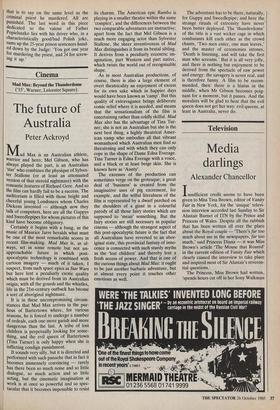Cinema
The future of Australia
Peter Ackroyd
Mad Max is an Australian athlete, warrior and hero; Mel Gibson, who has always played the part, is an Australian star' who combines the physique of Sylves- ter Stallone (or at least an attenuated version of that steroid nightmare) with the romantic features of Richard Gere. And so the film can hardly fail to be a success. The auditorium is filled with those bright and cheerful young Londoners whom Charles Dickens invented — although now they talk of computers, here are all the Guppys and Sweedlepipes for whom pictures of this kind have become obligatory. Certainly it begins with a bang, as the music of Maurice Jarre heralds what must be one of the most remarkable scores in recent film-making. Mad Max is, as al- ways, set in some remote but not un- approachable future in which post- apocalyptic technology is combined with cartoon imagery — much of it taken, I suspect, from such space epics as Star Wars but here lent a peculiarly exotic quality which must be derived from its Australian origin; with all the gourds and the whistles, life in the 21st-century outback has beome a sort of aboriginal nightmare.
It is in these uncompromising circum- stances that Mad Max arrives in the pur- lieus of Bartertown where, for various reasons, he is forced to undergo a number of ordeals, each one more garish and more dangerous than the last. A tribe of lost children is perpetually looking for some- thing, and the evil queen of Bartertown (Tina Turner) is only happy when she is inflicting condign punishment. It sounds very silly, but it is directed and performed with such panache that in fact it becomes immensely convincing — rarely has there been so much noise and so little dialogue, so much action and so little acting, but the cinematic imagination at work is at once so powerful and so spec- tacular that it becomes impossible to resist its charms. The American epic Rambo is playing in a smaller theatre within the same 'complex', and the differences between the two comparable adventures are instructive: apart from the fact that Mel Gibson is a much more engaging actor than Sylvester Stallone, the sheer inventiveness of Mad Max distinguishes it from its brutal sibling. It derives from a peculiarly eccentric im- agination, part Western and part native, which twists the world out of recognisable shape.
As in most Australian productions, of course, there is also a large element of overt theatricality an enjoyment of excess for its own sake which in happier days would have been known as 'camp'. But this quality of extravagance brings deliberate comic relief where it is needed, and means that the sensationalism of the film is entertaining rather than coldly skilful. Mad Max also has the advantage of Tina Tur- ner; she is not an Australian but she is the next best thing, a highly theatrical Amer- ican vamp who embodies all that vibrant womanhood which Australian men find so threatening and with which they can only cope in the shape of Dame Edna Everage. Tina Turner is Edna Everage with a voice, and a black or at least beige skin. She is known here as 'Aunty'.
The excesses of the production can sometimes verge on the grotesque; a great deal of 'business' is created from the imaginative uses of pig excrement, for example, and the wilful literalness of the film is represented by a dwarf perched on the shoulders of a giant in a colourful parody of all those fairy stories which are supposed to 'mean' something. But the fairy stories are still necessary in popular cinema — although the strangest aspect of this post-apocalyptic future is the fact that all Australians have reverted to an abor- iginal state, this provincial fantasy of inno- cence is connected with such sturdy myths as the 'lost children' and thereby lent a fresh access of power. And that is one of the curious things about Mad Max: it ought to be just another barbaric adventure, but at almost every point it touches other emotions as well. The adventure has to be there, naturally, for Guppy and Sweedlepipe; and here the. strange rituals of extremity have never' been better deployed. The `thunderdome' of the title is a vast wicker cage in which combatants kill each other as the crowd chants, 'Two men enter, one man leaves,' and the master of ceremonies intones, 'Death is listening, and will take the first man who screams.' But it is all very jolly, and there is nothing but enjoyment to be derived from the spectacle of raw power and energy: the savagery is never real, and is therefore funny. A film to be recom- mended, then: there is a hiatus in the middle, when Mr Gibson becomes poig- nant for a moment, but it passes. And the moralists will be glad to hear that the evil queen does not get her way: evil queens, at least in Australia, never do.


























































 Previous page
Previous page